A fortunate life

Ernest Brough at the Australian War Memorial.
It’s early morning and Ernest Brough is standing in the Commemorative Area at the Australian War Memorial in Canberra. In his hand is a cap that was given to him after he and two others escaped from an Austrian prisoner of war camp during the Second World War and embarked on a remarkable journey through Slovenia and Croatia to Bosnia.
The cherished cap with its distinctive red star belonged to a Yugoslav partisan, Puks Boris, who helped Brough during his desperate flight to freedom in 1944. It’s old and worn now, and Brough hasn’t seen it in almost a decade, but he’s travelled from his home in country Victoria to donate it to the Memorial and couldn’t be happier.
Brough, now 98, smiles and laughs as he shares his remarkable story of survival. But it wasn’t always so. For 30 or 40 years after the war, Brough couldn’t talk much about it.
“It takes a long time to make sense of some things, and some things will never make sense,” he writes in his book Dangerous days: a digger’s great escape. “But now I am an old bloke, I can say what I like. I can tell my truths as I remember them. War is a terrible thing, we all know that. If I knew how to stop such stupid, pointless destruction, I’d do it today …
“Plenty of times [I] could have lost [my] life and it’s only luck, life’s lottery, that decided to keep me here. To this day, I don’t know how or why the bullet with my name on it missed me. Well, a couple of bullets didn’t miss me, but they didn’t kill me either. Maybe, as they say, fortune favours the brave, or maybe only the good die young.”
Today, Brough still wonders how he and his mates survived the things they did during the war and how they managed to make it home.
“I suppose [I was] brave, or mad, one of the two, but I think you’ve got to be both, [although] I didn’t feel brave. I just felt mad. It was just how you got. [And I thought], bugger them,” Brough said. “I was never ever frightened. I knew I was going back and getting back to where I wanted to go … [But] you’ve got to have a tough hide. You’ve just got to grin and bear it, and never give in. Fight on all the time… We were always fair dinkum, and people are people. They’re all human, and everybody looks to help one another, so it wasn’t hard, really. You just had to get in there and have a go.”
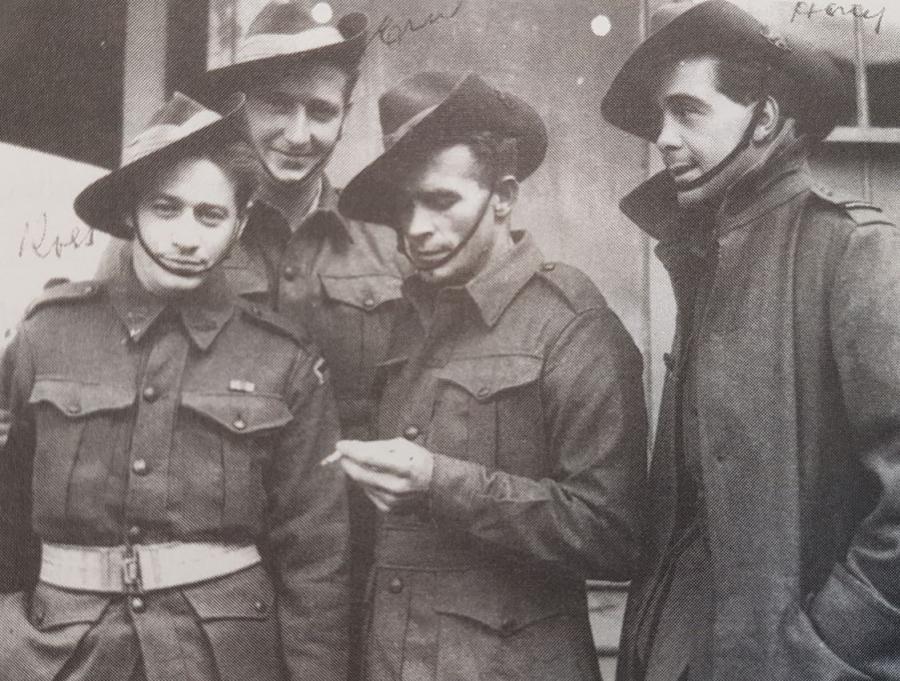
Ernest Brough, pictured second from left, with Ross Sayers, Allan Berry and Harry Lesar at Port Melbourne in 1944.
Photo: Courtesy Ernest Brough
Brough was working as a “butcher boy” in Drouin in country Victoria when war broke out in 1939. His mother’s cousin was Albert Jacka, who was awarded Australia's first Victoria Cross of the First World War for his actions at Gallipoli. Brough grew up with Jacka’s photograph on the sideboard in the dining room, and knew his story well. When Australia declared war on Germany, Brough decided he wanted to make his mother proud and do something to help. More than 75 years later, he laughs when asked why he decided to join up.
“Well, I’m buggered if I know,” he said with a grin. “I went down to the station and I said, ‘I want to join up,’ and they said, ‘How old are you?’ I said, ‘Nineteen’, and he said, ‘Well, could you go for a walk around the block, and you’ll be a bit older when you come back?’ And I said, ‘Yeah, I can do that for you.’ So I walked away for a while and I came back five or 10 minutes later, and he said, ‘How old are you know? And I said, ‘Twenty.’
“So that’s how I got in the army. And, of course, I was a regular bloody nuisance too. I’d be in everything but a bloody sandwich you know. It didn’t matter what it was.”
Brough fought at the besieged harbour town of Tobruk which he feared was "Gallipoli all over again", and at El Alamein. “That was pretty tough,” he said quietly, looking off into the distance. “But never mind, it’s all part of it. The thing is not to have fear, and I didn’t. I wasn’t frightened of nothing, nothing at all. I knew when to step aside, when it was getting a bit thick, see, step aside, let them have a go, and creep back again, and all that sort of thing.”
At Tobruk, he and his mates lived “like rats” in foxholes and dug-outs for months on end, enduring blistering heat during the day and bitter cold at night, as well as hellish dust storms. In stifling heat, he survived on one bottle of water a day and didn’t take off his boots for a month. He lived with fleas and flies, dysentery, malnutrition and the blood of other men spattered on his clothes and his unwashed body, often wondering if he would make it through the night.
It was there that Brough was sent on what he calls a suicide mission and was wounded in the arm and the backside. But he never lost his humanity. At El Alamein in October 1942, he piggybacked a badly wounded German soldier to German lines under heavy fire.
“They came in one night, and we were just about ready to go to bed,” Brough said. “We didn’t know what to do. They were everywhere… The next morning, we searched their dugouts… I was walking along and … I saw a curtain move, so I opened it up, and there he was. He had a foot just about blown off. It was shattered. It was all smashed to pieces, so I pulled my cigarettes out, gave him a cigarette, lit it, and put him on my back, and I carried him up to his own hospital.
“A tank missile came across, and bloody well nearly took my head off. I went to ground, and he was still on top of me, so we got up, and got going again. I got to the hospital, and they’re in there saying, ‘Don’t shoot, don’t shoot, don’t shoot.’ I’m standing there like a big fat melon … like a bloody old burnt pumpkin … and I thought, ‘Bugger this, I’ll go back to my dugout again,’ and back again I went … I walked off as if I owned the joint, and they’re all standing there, saying, ‘Oh, who’s that bloke? What’s he doing?’ And I was walking away as if I was having a good old time …
“Fortune favours the bold [and] if you’ve got the guts to have a go, the others don’t wake up until you’ve gone. And it’s quite true too.”
He laughs when asked if he was frightened. “No, I wasn’t scared,” he said simply. “That’s the funny part about it. It was sort of a big joke, but that’s probably because I had some of Albert Jacka’s blood in me ... My mother was his cousin, and I reckon, I got a flash of blood from her that stopped me … I had no fear, no fear whatsoever. I used to work it over and think about it, but I was not frightened of anything. It’s amazing … See, no fear – don’t give in, and no fear – it’s a wonderful thing to have.”

Ernest Brough with Director Dr Brendan Nelson.
Three hours later the tanks came and Brough was taken prisoner and handed over to the Italians. He remembers pulling the lining out of his tin hat and using the hat as a saucepan to boil up a kind of stew with his meagre rations so that his hat would be warm when he went to sleep. He did this all the way to Tripoli, where he was loaded into the hold of a coastal freighter bound for Italy. Worried they would be torpedoed as they crossed the Mediterranean, he and the other prisoners spent the night singing every song they knew over and over again as loudly as they could in a desperate attempt to alert any British submarines to hold fire.
“The Italians must have wondered what the hell was going on,” he said in his book. “They kept telling us to shut up; what they didn’t realise is that we were saving their souls as well as ours. It worked. We made it to Italy alive.”
Brough was taken to a prisoner of war camp near Gruppignano called PG57, home to two to three thousand men and “several billion lice as well”.
“It was pretty rough because you had no authority, and they might come along with a bit of bloody bread or something like that,” he said. “They were supposed to be giving you a [bowl] of something to eat and it would be full of bloody water with a lettuce leaf and a grub in it or something. It was a make believe feed. It was nothing. All they wanted to do was starve you. So the thing was to get out as quick as you could.”
After Italy capitulated in 1943, Brough was loaded onto a cattle truck and ended up at Stalag 18 A/Z at Spittatl an der Drau in southern Austria. He remembers lying on his back on the ground to watch the bombs fall as waves of Allied Boston bombers flew over to attack German bases, factories and railway lines, and still has the prisoner of war tag he was given as a reminder of his good fortune. The tag, which he keeps in a small case along with his dog tags and a couple of old coins from the Middle East, is scored down the middle. If he had died, the tag would have been broken in half along that line, one half to be buried with him, the other half to be sent to the Red Cross.
“The sooner we got out of that the better,” Brough said, laughing once more. “They just put us into the prison camp and shut the door and I said to one bloke, ‘How do you get out of this joint?’ And he said, ‘I can open the door any time you like.’ And he could.”
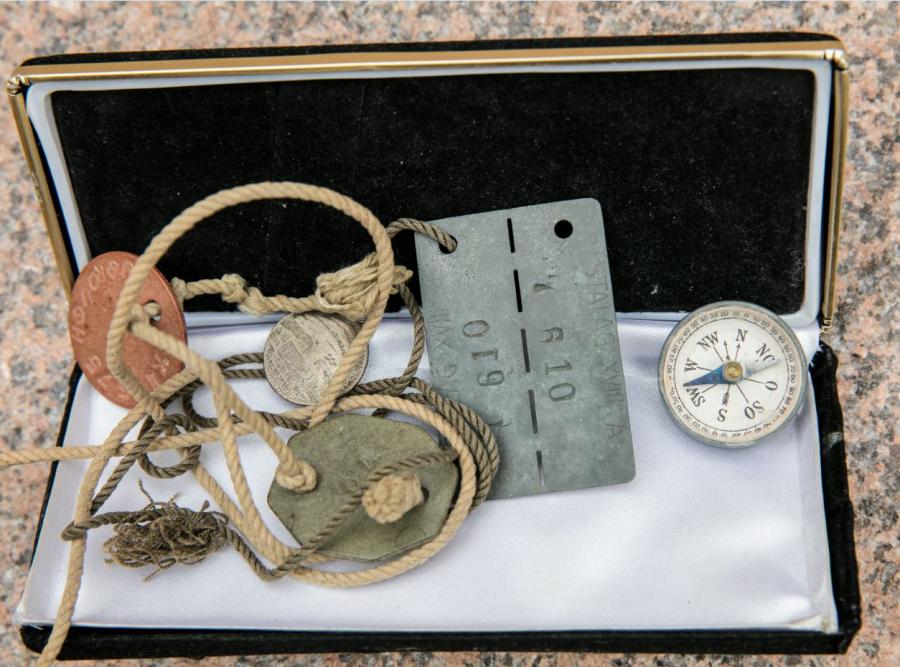
Ernest Brough's compass is pictured alongside his prisoner of war tag.
On Good Friday 1944, Brough escaped with New Zealander Eric Batty and West Australian Allan Berry and embarked on an extraordinary journey through Slovenia and Croatia to Bosnia. They stuffed their trousers and socks with supplies from Red Cross parcels, and travelled by night, using the moon, a stolen map and handmade compass, which he still has, to guide them.
“What we did not know at the time was that there had been a mass escape from a high-security camp called Stalag Luft III – the one made famous in the film The Great Escape,” Brough said in his book. “The Germans were on extra alert for escapees … and the village … and its surrounds would have been crawling with guards. But we didn’t know anything about it, which probably was just as well…”
The three swam across icy rivers, traversed snowy mountain passes, and hid under piles of leaves and in lofts and ditches wherever they could. They were nearly caught countless times, escaping once by pretending to be Germans. “We learned to kip on the hard ground, back-to-belly, cuddling one another for warmth and rotating every hour or so,” he said in his book. “When we woke, our clothes would be stiff [with the cold] and it would be ten minutes before we could say a word to each other, we were so cold.”
They developed a special bond between them as they depended on each other completely for their survival. “It’s a great thing to have faith in one another,” Brough said. “We’d have a good place to camp for the night behind a shed, or somewhere like that, and the boys would say … ‘‘Oh, this is a good spot, we’ll stay here again tonight,’ and I would say, ‘No, we’ll keep moving.’ You never stay there a second night because someone will come along and say those blokes are still up there sleeping, but we wouldn’t be there sleeping, we would have moved on. We used to move on every night to a different place.”
But their daring escape nearly came undone when they had to swim across the Drava River. They built a raft to carry supplies, and stripped naked, bundling their clothes and stores of food on the raft, but Berry got a cramp, and Brough, who wasn’t a strong swimmer, struggled too. If it wasn’t for Batty, they wouldn’t have survived.
“It was so cold it hurt,” Brough said in his book. “It seemed an eternity later that we pulled the raft up onto the far bank, exhausted; and fairly devastated. The raft had proved to be a bit of a disaster … Our clothes were sodden and I’d seen several of our food parcels float away into the night … We were in a state of shock. Allen and I weren’t sure we could go on.”
But go on they did. They hid in a tunnel, and dried their clothes as best they could over a fire they started using twigs and a cigarette lighter. Brough remembers being so cold and hungry that they were grateful for any food they could get. “One of the ladies once gave us a big heap of brown Spanish onions,” he said, laughing once again. “Well, have you ever tried eating brown Spanish onions on their own? We sat in an old dug out, and the three of us were eating these onions, and the tears were bloody streaming down our faces.”
Finally, they made it to Croatia and were taken in by a group of Partisans, the Yugoslav resistance fighters who wore the distinctive plain caps sporting the red star of communism. “I called into this place to get some bread because we were out of tucker,” Brough said. “The manager came along and he said, ‘Well, if you’re not who you say you are, you’re going to be executed.’ And we thought, ‘Shit, that will be nice, a bullet in the head.’ They didn’t want any strangers coming in amongst them, you see, so they said, ‘We’ll sort it out and see what happens tomorrow.’”
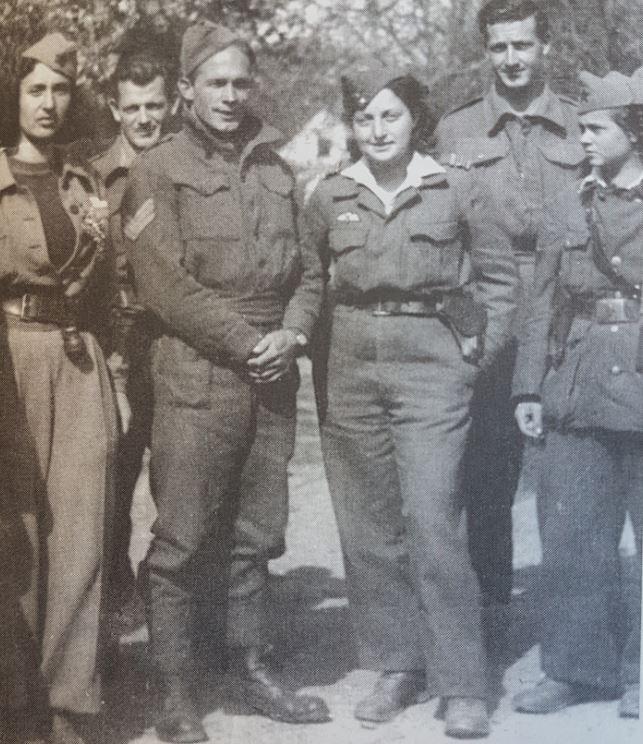
Ernest Brough, pictured second from right, with a group of Partisans and a British liaison officer. Allan Berry is pictured third from left and Eric Batty is behind him.
Photo: Courtesy Ernest Brough
Brough and his mates travelled with the partisans for weeks as they raided villages and clashed with the Ustashi, the ultra-nationalists who ran Croatia and were allies of the Nazis. The partisans didn’t take prisoners, and Brough even saw one execute his own brother, but he learnt to hold his tongue and not get involved. “If I’d kicked up a fuss, the next bullet would have been for me,” he wrote.
They eventually made it to the outskirts of Banja Luka in the north of Bosnia, and on 10 June 1944 – more than two months since they had broken out of the prison camp in Austria – they were told a plane was coming for them. That night, they watched helplessly as it overshot the makeshift runway and disappeared down the side of a hill. They found it bogged in a swamp, and the American crew wanted to burn it so that the enemy couldn’t get their hands on it, but Brough and his mates were having none of it. With the help of locals and a team of bullocks, the plane was salvaged and they were flown to Bari in Italy on 12 June 1944.
“Allan, Eric and I were too tired and relieved to appreciate it too much at the time, but it was really quite a moment,” he said in his book. “Against the odds, we had made good our escape.”
When Brough returned to Australia, he received the Military Medal for his courage in persistent attempts to escape prisoner of war camps. He returned to the butcher’s shop in Drouin, and went on to marry the love of his life, Edna May Stevenson. But like many he found it hard to adjust after the war.
“While I looked all right on the outside, the perfect model of a returned soldier, I wasn’t all all right,” he said in his book. He felt “wild on the inside” and developed “this dreadful shake” in his left hand. He would disappear for days at a time, drinking and fighting, and suffered from terrible nightmares, once almost throttling his wife in his sleep.
“I’d been living like a wild man for months, and you can’t just get that out of your system overnight, he wrote. “Really, Allan, Eric, and I had lived like dogs. Every day had been a dangerous day, every shadow a possible predator. We survived on instinct, so it was always going to be difficult to slip back into the civilised world. You would only have to look at me the wrong way back then and I’d have a go at you.”
He later learnt too that he was kept under surveillance because of his association with the partisans during the war. He’d treasured the cap that Puks Boris had given him, and had proudly showed it, and the letters Puks sent to him after the war, to everyone. But Puks was a communist, and that made Brough a man under suspicion. He was so shaken by the news, he never wrote to Puks again.
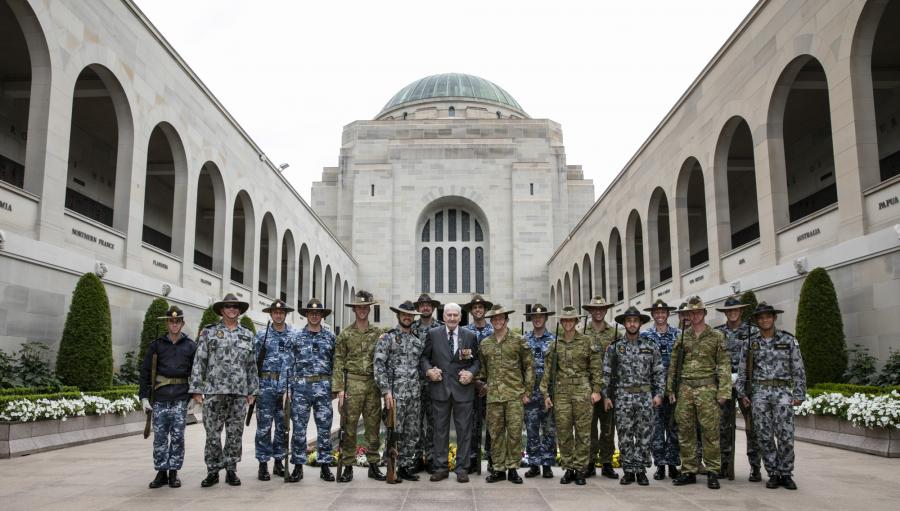
Ernest Brough with members of the Federation Guard
Today, Brough lives in Geelong and has travelled to Canberra to donate the cap with journalist Marc McEvoy. After his wife died in 2004, Brough was so grateful for the treatment she received while suffering from Alzheimer’s, that he donated the $300,000 proceeds from the sale of his home to St Vincent’s Hospital in Melbourne for a new heart machine. The staff at the hospital suggested he write a book about his experiences, but Brough wasn’t convinced at first.
He eventually agreed, sharing his story with author Kim Kelly who called him every day for a month between 5.30 and 7.30 at night to ghost-write his memoir so that he could donate the earnings from the sale of the book to patient care and research into Alzheimer’s and dementia at St Vincent’s.
It was after Dangerous days was published in 2009 that Brough first met McEvoy at the Harper Collins office in Pymble in Sydney. McEvoy had worked as a press and information officer for the United Nations in Bosnia and Croatia and was a spokesperson for the UN peacekeeping mission in Macedonia and Kosovo.
“I think Ern found it interesting that I’d been to where he’d been … in the war in the 1990s,” McEvoy said. “I was taken by the significance of the cap which was photographed in his book and he said to me, ‘Well, do you want it?’ I said I wasn’t sure if I could accept such a thing, and then a couple of weeks later he’d posted it to me with [a] note addressed to me. I thanked him and he said to me, ‘You have to give it to the War Memorial when I pass away if you’re going to have the cap.’”
McEvoy agreed, but decided to donate the cap earlier so that Brough could be the one to present it.
For Brough it’s a very special moment, and there’s no hiding his smile when he is reunited with McEvoy and his cherished cap for the first time in almost a decade. He bursts into song and happily chats to members of the Federation Guard as they practise for the Last Post Ceremony before making his presentation.
Brough is the only one left now. His mates Allan Berry and Eric Batty have both passed away – Berry died in 1985 and Batty died in 1999 – but Brough will never forget them.
“Eric, Allan and I could hardly have been closer to one another if we had been surgically fused during our wartime adventures,” he wrote in his book. “We’d bonded, as they say now. We knew each other’s minds and hearts. It was the sort of closeness that comes only from confronting death together, again and again.”
He still considers war to be a “horrendous folly”. But despite everything he went through, he doesn’t regret the decision he made when he was just 19 years old. “War’s a damnable thing,” Brough says in his book. “Don’t let anyone ever tell you otherwise. The damage runs deep. Most soldiers will bring the war home with them in some form. Some will never forget it; some will die from it; from suicide or alcoholism, years after the guns have packed up and gone home. You see, it’s just not natural for human beings to go out and kill other humans. And that’s what war’s all about.”
These days, he admits his memory isn’t what it used to be, but he doesn’t let it bother him.
“I say things and I forget what I say,” Brough said, laughing once more. “It’s true too. You can’t remember everything, and I don’t intend to keep on remembering everything. You do that, and it will drive you mad at the end of the world …
“For a bloke who could have died many times, I’ve lived a lucky life … And if this old bloke has one piece of advice to impart it’s this: Live your heaven on earth – today.”
Read Marc McEvoy's personal story about Ernest Brough in the Reader's Digest here.
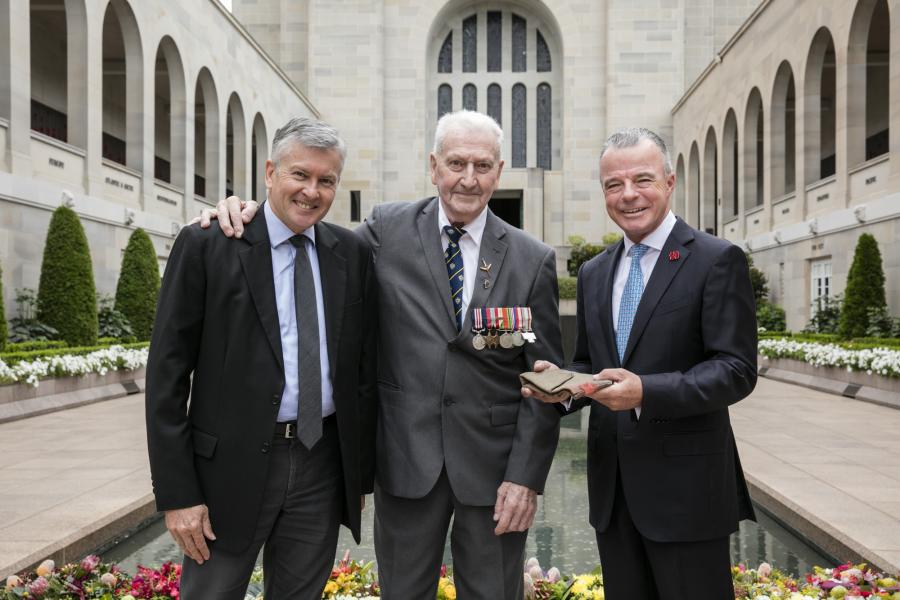
Journalist Marc McEvoy with Ernest Brough and Director Dr Brendan Nelson.